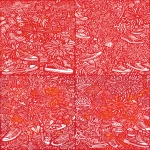Explore the Best AI Image Gallery

Beyond the Brush: How Edge Computing is Transforming Creative Expression
The creative landscape is undergoing a seismic shift, driven by the transformative power of edge computing. This technology, which processes data closer to its source, is revolutionizing how artists, designers, and innovators conceive, create, and experience art. From immersive installations to responsive performances, edge computing is blurring the lines between the physical and digital worlds, empowering creators with unprecedented possibilities.
Edge Computing: A New Frontier for Creativity
Traditionally, creative processes have relied on centralized computing power. However, edge computings distributed nature allows for real-time data processing and analysis, enabling immediate feedback loops and dynamic interactions. This opens up a realm of exciting applications:
Interactive Art Installations
Imagine stepping into an art installation where your movements trigger changes in light, sound, or projections. Edge computing enables interactive experiences that respond to viewers in real time, fostering a sense of immersion and co-creation. Artists can use sensors embedded in the environment to capture user data and translate it into captivating visual or auditory displays.
Responsive Performance Art
Edge computing empowers performers with wearable technology that reacts to their movements and emotions. Dancers, musicians, and actors can utilize sensors integrated into costumes or instruments to generate dynamic soundtracks, lighting effects, or even virtual projections that evolve alongside their performance. This creates a truly symbiotic relationship between the artist and technology.
Personalized Creative Experiences
Edge computing enables the creation of personalized art experiences tailored to individual preferences. Imagine an art gallery where visitors can select themes or styles, and the displayed artwork dynamically adapts based on their choices. This level of customization fosters a deeper engagement with the art and empowers viewers to actively participate in shaping their creative journey.
Ethical Considerations: Navigating Uncharted Territory
As edge computing reshapes the creative industry, it also raises important ethical considerations:
Data Privacy and Security
Edge computing often involves collecting vast amounts of user data. It is crucial to implement robust privacy safeguards and ensure transparent data handling practices to protect individuals information.
Algorithmic Bias
Algorithms used in edge computing systems can perpetuate existing biases if not carefully designed and monitored. Artists and developers must strive for fairness and inclusivity in their creations to avoid reinforcing societal inequalities.
Ownership and Authorship
When AI algorithms contribute to creative outputs, questions arise regarding authorship and intellectual property rights. Clear guidelines and legal frameworks are needed to address these evolving challenges.
Future Trends: A Glimpse into the Creative Horizon
The future of edge computing in the creative industry is brimming with possibilities:
Hyper-Personalized Art
Imagine artworks that evolve and adapt based on your emotions, preferences, or even memories. Edge computing will enable the creation of truly personalized art experiences that resonate on a deeply personal level.
Collaborative Creative Platforms
Edge computing will facilitate seamless collaboration between artists across geographical boundaries. Imagine real-time co-creation studios where individuals can contribute to artworks from anywhere in the world.
Democratization of Creativity
By lowering the barriers to entry, edge computing will empower anyone with a creative spark to express themselves through innovative mediums. This democratization of creativity has the potential to foster a more inclusive and diverse artistic landscape.
Conclusion
Edge computing is poised to revolutionize the creative industry, empowering artists, designers, and innovators to push the boundaries of imagination. By embracing its transformative potential while navigating ethical considerations thoughtfully, we can unlock a future where creativity knows no limits.


](https://images.ai-img.art/thumbnails/150/7e9b41fbb65a90134a2fd0e559a0109a3d9a10a0d23b6db763b78af62c6c959f.webp)


](https://images.ai-img.art/thumbnails/150/6e8a3216fd7ecc40d3eb9ad0af56b618b8e64baead93e99d72be4415d6febb19.webp)




](https://images.ai-img.art/thumbnails/150/533316f23279ccc41f1c6cdc33bab703cca49f31e472cd42e9c9b2836695da60.webp)




](https://images.ai-img.art/thumbnails/150/9b53a710c40e5620916d1d89ef4488c744a3f03e77438eef5e99222eb91ace7c.webp)










](https://images.ai-img.art/thumbnails/150/1db67956a0d084be696b5ee69f90fd0c2e3964e53bf69aaab3ec21c48c72a36c.webp)



](https://images.ai-img.art/thumbnails/150/0ff19e66dcffaa9ebe43272f5894107cd75db678948d4111cafecbddf3028e25.webp)








](https://images.ai-img.art/thumbnails/150/0eb51efd63b8f1146f32c0cf1601bcd034a21d23ba004cd44aa6293dd0fcd06f.webp)
](https://images.ai-img.art/thumbnails/150/b1dfd1e276d319bc7f1b3a132da8960830406c7bf997edcaa8e84a72549b5ba4.webp)


](https://images.ai-img.art/thumbnails/150/3257d17813bfa1c24f3fa74d44a4ecf485773a374d3b8759a30d23d087a0bd03.webp)

](https://images.ai-img.art/thumbnails/150/da27041d382a18620da87c26f8906f4bd058b0f97fddeac97c814c1a2c1697dd.webp)



